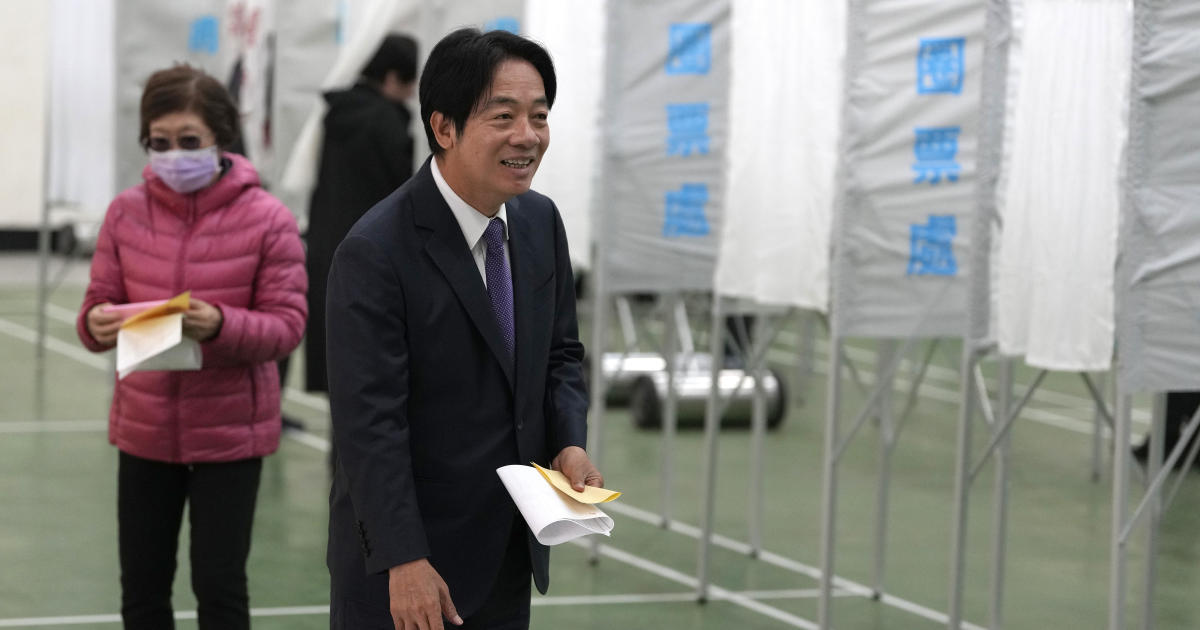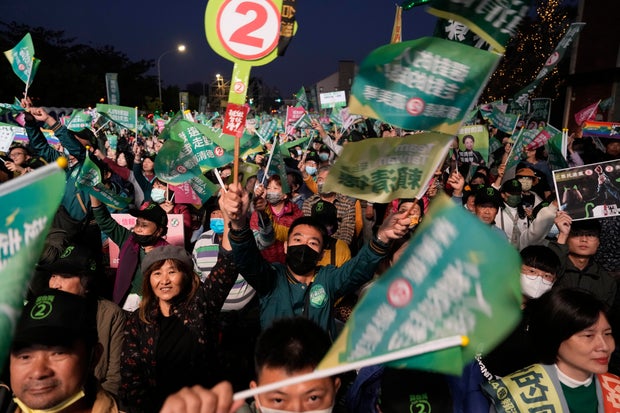Ruling-party candidate Lai Ching-te has emerged victorious in Taiwan’s presidential election, and his opponents have conceded after ballots were cast at thousands of polling stations in a tight three-way race.
The result in Taiwan’s presidential and parliamentary election will chart the trajectory of relations with China over the next four years. At stake is the peace and stability of the 110-mile-wide strip of water between the Chinese mainland and the self-governed island, which is claimed by China as its own. China had previously called the election a choice between peace and war.
Lai is the vice president of the island’s governing Democratic Progressive Party, or DPP.
Lai, who also goes by the name William Lai, and incumbent President Tsai Ing-wen reject China’s sovereignty claims over Taiwan, a former Japanese colony that split from the mainland amid civil war in 1949. They have, however, offered to speak with Beijing, which has repeatedly refused to hold talks and called them separatists. Beijing has strongly opposed Lai’s election.
Ng Han Guan / AP
“Every election in Taiwan is significant because of the potential for Beijing reacting in a way that could contribute to further instability in the region,” Taipei-based political analyst Michael Cole told CBS News ahead of the election.
U.S. Secretary of State Antony Blinken congratulated Lai on his election win, and congratulated the “Taiwan people for once again demonstrating the strength of their robust democratic system and electoral process.”
“The United States is committed to maintaining cross-Strait peace and stability, and the peaceful resolution of differences, free from coercion and pressure. The partnership between the American people and the people on Taiwan, rooted in democratic values, continues to broaden and deepen across economic, cultural, and people-to-people ties,” Blinken said.
Mike Johnson, the Speaker of the U.S. House of Representatives, congratulated Lai in a statement released Saturday morning. Johnson had met with Taiwan’s ambassador to the U.S., Alexander Yui, and conveyed his support for security and democracy in the region.
Johnson added that he would ask the chairs of relevant House Committees to lead a delegation to Taipei after Lai is inaugurated in May.
Former House Speaker Nancy Pelosi took to X on Saturday to offer congratulations.
Beijing is believed to have favored the candidate from the more China-friendly Nationalist party, also known as Kuomintang, or KMT. Its candidate, Hou Yu-ih, has also promised to restart talks with China while bolstering national defense. He promised not to move toward unifying the two sides of the Taiwan Strait if elected.
The other leading candidate was Ko Wen-je, of the smaller Taiwan People’s Party, or TPP. A former mayor of Taipei, he had drawn the support of young people wanting an alternative to the traditional parties, which have largely taken turns governing since the 1990s.
For Tony Chen, a 74-year-old retiree who voted in Taipei in the hour before the polls closed, the election boiled down to a choice between communism and democracy.
“I hope democracy wins,” he said. He added that more Taiwanese were open to China’s model of governance decades ago, when the Chinese economy was growing by double digits annually, but are repulsed by the crackdown on civil liberties that has occurred under current Chinese President Xi Jinping.
Stacy Chen, 43, said she has always voted for DPP because “Taiwan is an independent country.” She said she wanted her son to grow up in a country that is separate from China.
CBS News stringer Joanne Kuo said that she dreads a Chinese takeover of Taiwan and could not live under the ruling of the Chinese Communist Party.
“I don’t see how that can fit Taiwanese people’s values of democracy, of freedom,” Kuo said after voting in the election.
“Hong Kong’s experience in recent years is something that the Taiwanese most assuredly do not want for themselves,” said Cole, of the International Republican Institute in Taipei, before the election.
Beside the China tensions, domestic issues such as the dearth of affordable housing and stagnating wages have dominated the campaign. Taiwan’s economy is estimated to have grown just 1.4% last year. That partly reflects inevitable cycles in demand for computer chips and other exports from the high-tech, heavily trade-dependent manufacturing base, and a slowing of the Chinese economy.
Ng Han Guan / AP
For Ben Wang, 44, the vote was more about altering the dynamic between Taiwan’s main opposing parties, the DPP and the KMT. A potential attack by China could not be pre-empted by anything Taiwan would do, he said.
Taiwan’s election is seen as having “real and lasting influence on the geopolitical landscape,” said Gabrielle Reid, associate director with the global intelligence consultancy S-RM.
“The outcome of the vote will ultimately determine the nature of ties with China relative to the West and will have strong bearing on the state of play in the South China Sea,” she said.

















































